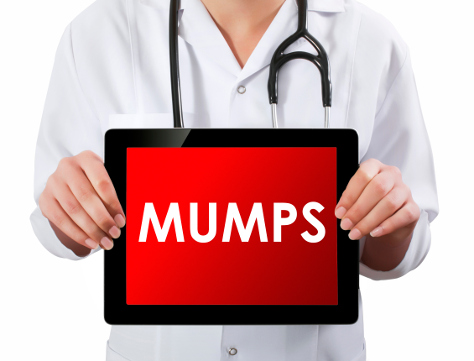What is mumps?
Mumps is a viral infection that usually affects children. It's highly infectious, but one infection usually gives you lifelong immunity. Mumps is caused by an airborne virus, so it's caught be inhaling droplets in the air or picking it up from contact with hard surfaces where the virus has settled.
The incidence of mumps fell dramatically with the introduction of the MMR (measles, mumps and rubella) vaccination in 1988.

However, in recent years, the take-up of the MMR has been erratic, mostly because of the now discredited link with autism and bowel disease. The subsequent rise in diagnosed cases of mumps rose from 100 in England and Wales in 1996 to 43,000 cases in 2005. Most cases were in teenagers and young adults, some of whom missed out on the introduction of the MMR, some who missed out on the introduction of the booster, and some who hadn't taken up the vaccine at all.
Mumps is contagious for about a week before and until a week after symptoms appear, which is two to three weeks after exposure to the virus.
There are some groups of people who should be protected from catching mumps. They are:
- teenagers and unvaccinated young adults
- expectant mums.
These groups are at risk of complications, including:
- acute pancreatitis and inflammation of the ovaries
- painful swelling of the testicles in men who have gone through puberty, which can result in reduced fertility
- secondary meningitis or, much more rarely, encephalitis
- hearing loss, although this is usually temporary.
The illness isn't usually serious in young children, and most recover within a fortnight with no ill effect.
What are the symptoms of Mumps?
The most common symptom of mumps is a swelling of the glands (known as parotid glands) on one or both sides of the face, below the ears and over the jaw. One may be swollen initially, but usually both are affected. This is what gives the appearance of having gobstoppers in the cheeks. The parotid glands make saliva.
Your child might complain of earache or tummyache, but around a third of children have such mild symptoms that mumps is barely detectable.
What are the treatments and remedies of Mumps?
If you suspect your child has mumps, you should get this confirmed by your GP.
Usually, no medical treatment is required but you can make your child more comfortable if they're in pain by giving the appropriate dose of children's paracetamol or ibuprofen.
Although drinking fluids may be difficult, encourage your child to take as much water as possible: give them a straw or lidded cup to make drinking easier.
Avoid giving fruit juices, as these stimulate production of saliva, which may increase your child's discomfort.
Consult your GP if your child's condition doesn't improve with pain relief, and get emergency treatment if you see signs of meningitis or encephalitis emerging.
If you have a teenager who has missed out on having an MMR booster, you should arrange for him to have it as soon as possible. It's estimated that 95% of the population needs to have been vaccinated in order to prevent outbreaks of measles, mumps and rubella.
This guide
The information in this Bounty A-Z of Family Health is not a substitute for an examination, diagnosis or treatment by a doctor, midwife, health visitor or any other qualified health professional. If in doubt, always speak to a doctor.
Bounty will not be held responsible or liable for any injury, loss, damage, or illness, however this occurs or appears, after using the information given on this website and in particular the A-Z of Family Health.
Further help
For health advice and information 24 hours a day, 365 days a year, the NHS offers call and web services. You can also visit NHS websites for services, health information and health news at nhs.uk
- England – call 111 from any landline or mobile phone free of charge, or visit nhs.uk
- Scotland – call 111 from any landline or mobile phone free of charge, or visit nhs24.com
- Wales – call 0845 4647 , or visit nhsdirect.wales.nhs.uk
- Northern Ireland – visit hscni.net